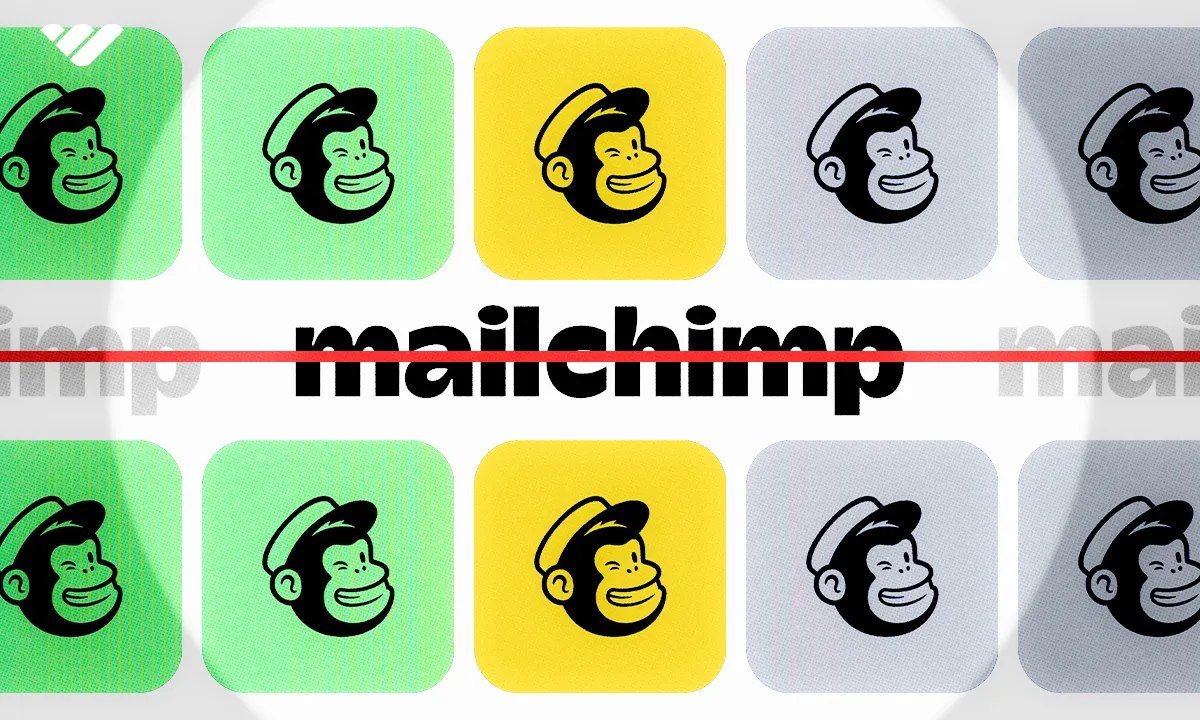Mailchimp is a popular marketing platform, but is it the right choice for you? Find our the pros and cons of Mailchimp, as well as 15 alternatives, in this article.
Key takeaways
- Different email platforms use different pricing models—some charge by contacts, others by emails sent or flat fees.
- Choose based on your specific needs: simple email tools for creatives, multi-channel marketing, or advanced automation capabilities.
- Many Mailchimp alternatives offer more generous free plans or better value for growing contact lists.
Once upon a time in the early 2000s, Mailchimp was the go-to email marketing platform.
Everyone—from creators to businesses to marketing agencies—was using it. Today, it’s still one of the top email marketing platforms, with over 11 million users worldwide. But, just because it’s popular doesn’t mean it’s the perfect fit for you.
Thankfully, there are Mailchimp alternatives that could better suit your needs. After a week of researching these alternatives and learning from first-hand user experiences, we narrowed them down to the top 15 worth your time.
But before we get into the list, let’s take a closer look at Mailchimp’s features and why you may be considering looking elsewhere.
What is Mailchimp?

When Mailchimp launched in 2001, it was dedicated to providing email marketing services to small businesses. It had a user-friendly newsletter editor, an extensive template library, and good automation and analytics tools…and it still does.
But, over the years, Mailchimp has evolved to be more than just an email marketing platform. It also supports SMS marketing, social media scheduling, and ads management. These features are great - but they’ve impacted Mailchimp’s user-friendliness and pricing plans.
The interface feels overwhelming to new users who just need a simple email marketing tool. The free plan is limited to 500 contacts and 1,000 monthly emails, which isn't much for starters…you'll likely hit your limit before getting your email marketing properly running.
The paid plans start at $20/month (currently $10 with a 50% discount) for 500 contacts and "12 x Contacts" monthly emails on the Standard plan. If you want to unlock Mailchimp's full feature set, the Premium plan starts at $350/month for 10,000 contacts.
Mailchimp has a responsive customer support team, but free plan users only get email support for the first 30 days. Standard and Essentials plans include 24/7 email and chat support, while phone support is reserved for Premium users only.
Mailchimp alternatives at a glance
If you want to get straight to the nitty-gritty and explore the features of 10 Mailchimp alternatives, check out this table. For a more in-depth exploration of these options, keep reading.
| Best For | Key Features | Pricing | |
|---|---|---|---|
| Whop | Digital solopreneurs looking for an all-in-one platform | Create, promote, and sell a wide range of digital products | No platform fees, commission fees start at 2.7% + $0.30 |
| Brevo | Managing multi-channel campaigns and communication | Email, SMS, web push notifications, WhatsApp, and live chat | Free plan. Paid plans start at $9/month |
| MailerLite | Small businesses that need an affordable email marketing tool | A/B testing tool for emails, signup forms, landing pages, automations | Free plan. Paid plans start at $15/month |
| Flodesk | Creatives looking for a budget-friendly platform for aesthetic emails | Aesthetic email templates with custom fonts | No free plan. Flat fee of $38/month |
| Constant Contact | Businesses that need an all-in-one digital marketing platform | Emails, SMS campaigns, social posts, ads, and events | No free plan. Paid plans start at $12/month |
| ActiveCampaign | Executing advanced sales and marketing automations |
Extensive automation and segmentation tools, built-in CRM with lead scoring feature |
No free plan. Paid plans start at $15/month |
| Klaviyo | Large ecommerce brands with complex needs | Segment users based on predictive insights | Limited free plan. Paid plan starts at $20/month |
| Omnisend | Small to medium ecommerce businesses | Extensive ecommerce features, user-friendly interface | Free plan with 24/7 support. Paid plans start at $16/month |
| GetResponse | Running email and webinar marketing campaigns | Webinar management tools and analytics | Free plan. Starter plan starts at $19/month |
| Sender | Startups looking for a basic and low-cost solution | Intuitive email editor with countdown timers and customer reviews | Free plan with 24/7 support. Tiered monthly plans or pay as you go plan |
| Moosend | Growing businesses that need advanced automation | Visual automation builder with AI features | Free trial. Pro plan starts at $7/month |
| EmailOctopus | Small businesses seeking cost-effective email marketing | Create and send campaigns through Amazon SES | Free plan with 2,500 subscribers. Pro plan starts at $24/month |
| HubSpot | Large organizations requiring full marketing capabilities | CRM, social media, advertising, and website tools | Free plan. Paid plans start at $15/month |
| Benchmark Email | Small businesses looking for an intuitive platform | Drag-and-drop editor with 200+ industry templates | Free plan with 500 contacts. Paid plans start at $9.99/month |
| Mailjet | Teams collaborating on email marketing campaigns | Real-time team editing, AI assistance, unlimited contacts | Free plan with 6,000 monthly emails. Paid plans starts at $17/month |
Top 15 Mailchimp alternatives
Without further ado, here’s an in-depth breakdown of the top 10 Mailchimp alternatives on our list.
1. Whop: Best for digital solopreneurs looking for an all-in-one platform to build an active and engaged community
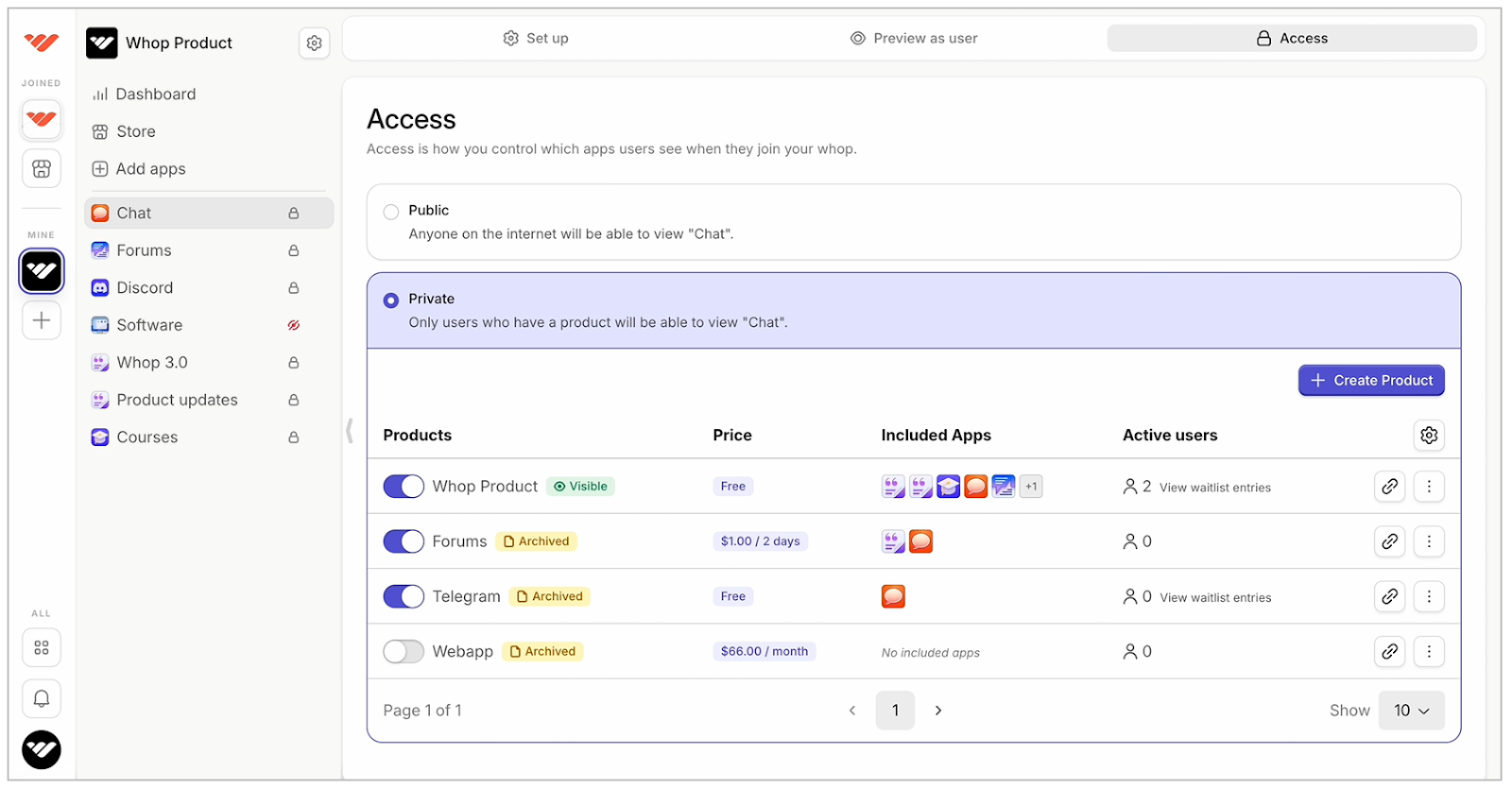
While Mailchimp is an email marketing platform that helps you promote your digital products, Whop is a platform that helps you host, manage, and accept payments for your digital products and services.
These digital products can be anything from courses, forums, and digital downloads, to events, Telegram groups, and Discord communities. You can offer these as a standalone product or put them together in a bundle for a one-time fee or subscription fee.
When you build a whop hub, you get to engage community members by hosting video calls, asking for their feedback, running giveaways, and more. Plus, you don't have to use all of these features in your whop - you can add and remove features (Whop apps) to suit your needs. And thanks to Whop’s Mailmodo integration, new customers who make a purchase from your Whop storefront will be added to your mailing list. This lets you communicate with customers about upcoming updates, product launches, and promotions.
Besides Mailmodo, you can connect with other email marketing tools via Whop’s Zapier integration. Just like setting up your Whop storefront, this process is easy-breezy.
Pros:
- A mobile app for you and your community
- User-friendly interface with dark mode option
- Market your products on Whop’s Marketplace*
- Boost conversions on your storefront by adding product details, FAQs, and customer reviews
Cons:
- Doesn’t have a built-in email marketing tool
Pricing:
Whop is completely free to use. Fees start at just 2.7% + $0.30 fee plus payment processing fees on each transaction.
2. Brevo: Best for managing multi-channel campaigns and communication
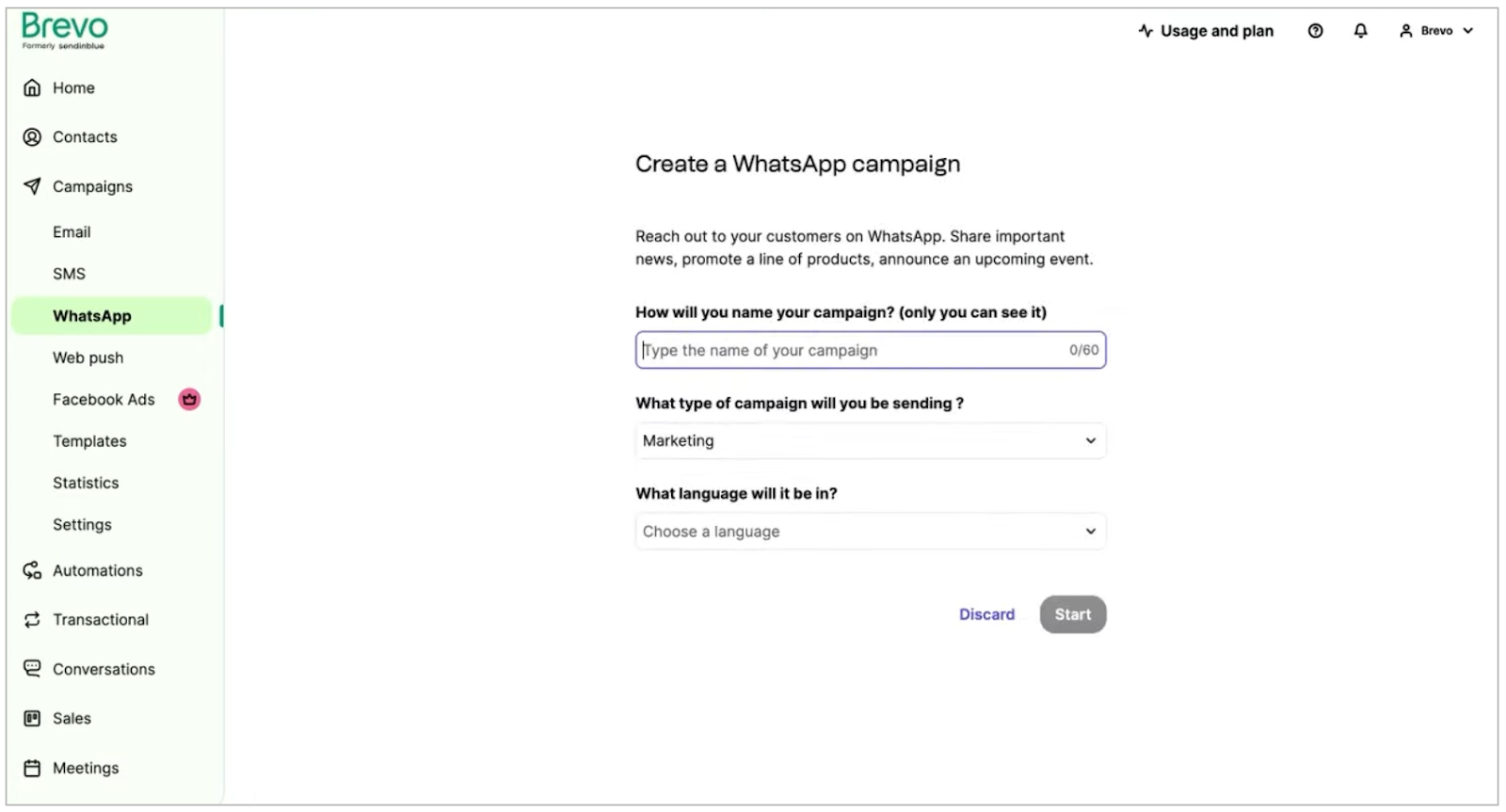
Like Mailchimp, Brevo (formerly Sendinblue) lets you set up email marketing, SMS campaigns, and transactional emails.
However, Brevo also supports communication across other channels like web push notifications, WhatsApp, live chat, and chatbot. And even better, it has a user-friendly interface that’s easy to navigate—you can access all these tools from the left navigation panel with a single click.
Brevo also has built-in CRM tools for tracking opportunities and closing deals. Create a custom sales pipeline and track every customer’s stage in this pipeline. When you’re ready to close them, you can share your booking page so your potential client can schedule a phone call or video call via Zoom, Google Meet, or Brevo’s own video calling platform.
Pros:
- Over 150 third-party integrations
- Run Facebook ads from your Brevo dashboard
- Access their 24/7 customer support team via email, live chat, or phone
Cons:
- Removing Brevo branding costs an additional $12/month
- Brevo’s landing page and A/B testing builders are only available on the Business and Enterprise plans
Pricing:
Brevo doesn’t charge based on the number of contacts you have. They only bill you for the number of emails you send.
On their free plan, you can only send 300 daily emails. The Starter and Business plans start at $9/month and $18/month for 5K monthly emails. Then there’s the Enterprise plan if you’re looking for personalized onboarding and customer support perks.
It’s important to note that Brevo bills you separately for using WhatsApp, SMS, web push notifications, and transactional emails.
3. MailerLite: Best for small businesses that need an affordable and feature-Rich email marketing tool
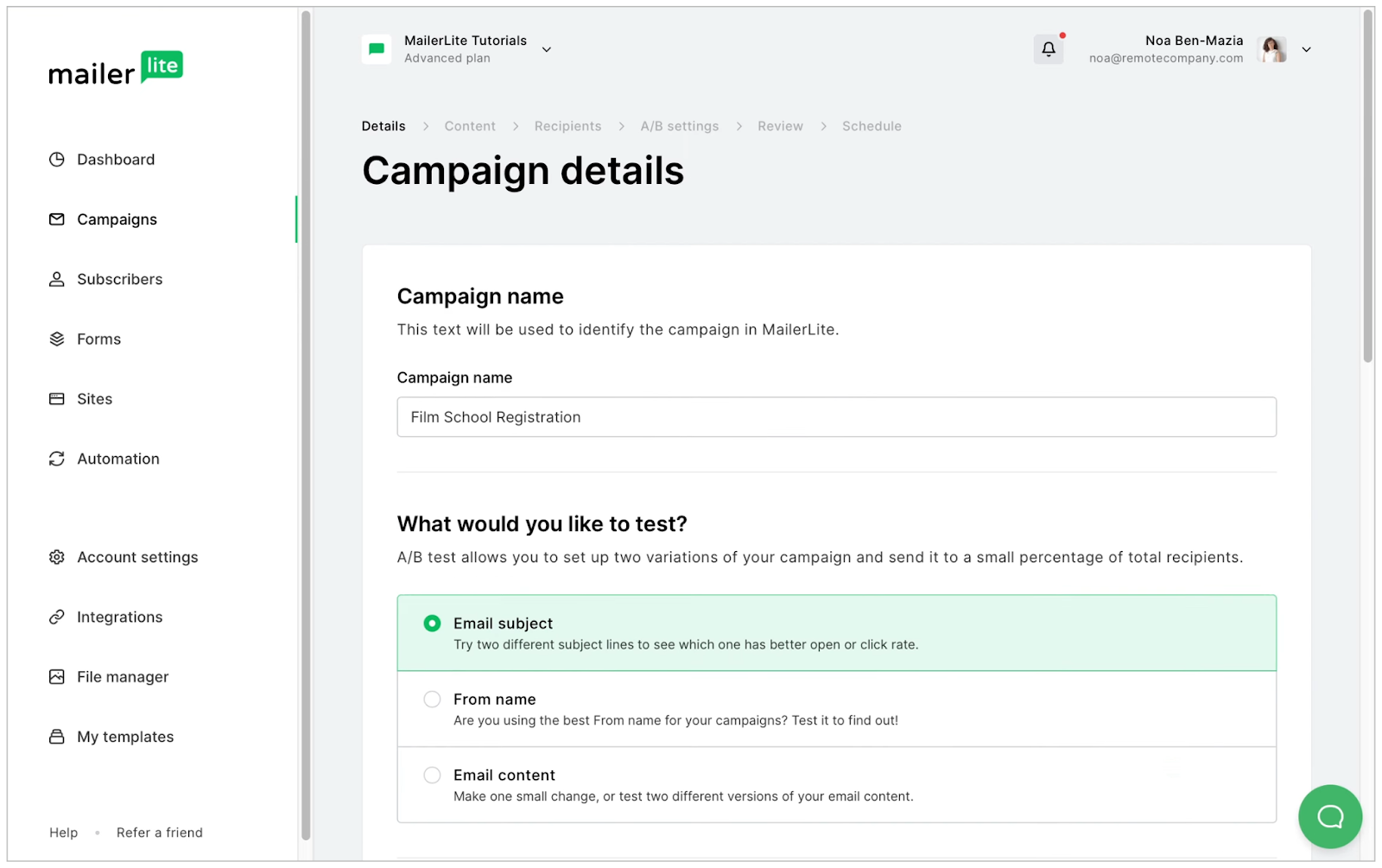
If you’re looking for a dedicated email marketing tool without all the bells and whistles, MailerLite might just be what you’re looking for. Its user-friendly interface makes it easy to find your way around in no time. But don’t be fooled, it still covers the core integrations, automations, segmentation, and analytics available in Mailchimp.
MailerLite stands out with its A/B testing toolset. It allows you to test different versions of your emails, signup forms, landing pages, and automations for higher conversions. All you have to do is create at least two versions of the assets you want to test and send it to a sample subscriber group for a specific time period. The winning content will automatically be shared with the rest of your subscribers.
Pros:
- Has a reputation for good email deliverability
- Add surveys and quizzes to your email campaigns
- Offers Mailersend, a paid service for sending transactional emails and SMS messages
Cons:
- Lacks advanced ecommerce automation triggers
- Live chat support is only available on the highest-paid plans
Pricing:
Brevo’s free plan gives you 1K subscribers and 12K monthly emails. The Growing Business and Advanced plans start at $15/month and $30/month for 1K subscribers and unlimited monthly emails. If you have over 100K subscribers, you’ll need to be on the Enterprise plan, which has custom pricing.
4. Flodesk: Best for creatives looking for a budget-friendly platform to design aesthetic emails
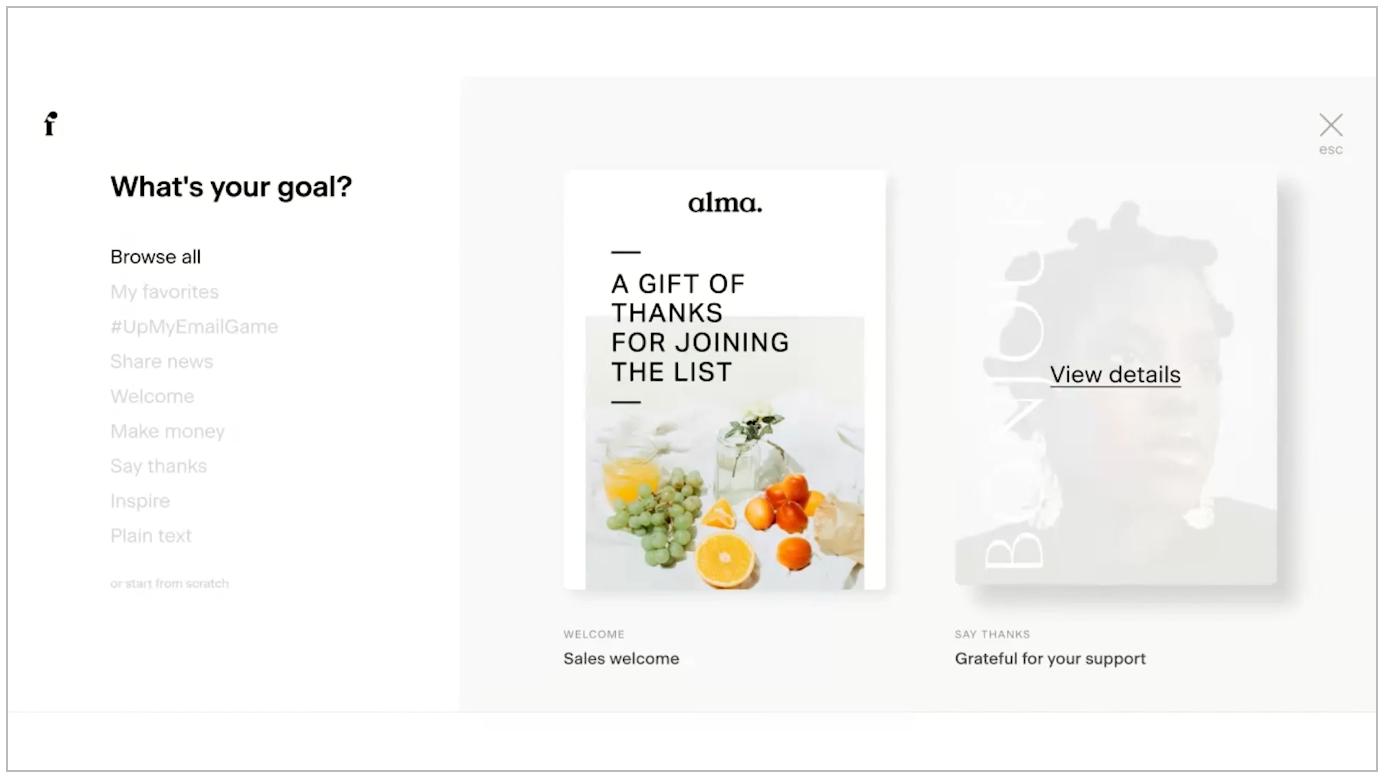
Flodesk is another tool that focuses on email marketing and nothing else, and it takes the simplicity and affordability of MailerLite to the next level. Flodesk has a super minimalist interface with a library of aesthetic templates to go with it. You can customize these templates with images, custom fonts, and Instagram feeds inside the intuitive drag-and drop email editor.
However, Flodesk lacks advanced automations, segmentation, and analytics. So if you have complex email needs, this isn’t the tool for you. But for creatives who just need a simple email platform to send on-brand campaigns, Flodesk is worth checking out.
Pros:
- Low learning curve
- Landing page builder
- Over 100 custom fonts
- Add your logo and brand colors so it’s easy to create on-brand assets
Cons:
- Email support only
- No A/B testing tool
- Limited native integrations
Pricing:
Flodesk doesn’t have a free plan or trial. However, you can unlock all of its email marketing features, unlimited contacts, and unlimited emails for a flat fee of $38/month. And if you want to unlock ecommerce features like sales pages, online payments, and payment processing, that’ll cost an additional $26/month, bringing the total to $64/month.
5. Constant Contact: Best for businesses that need an all-in-one digital marketing platform
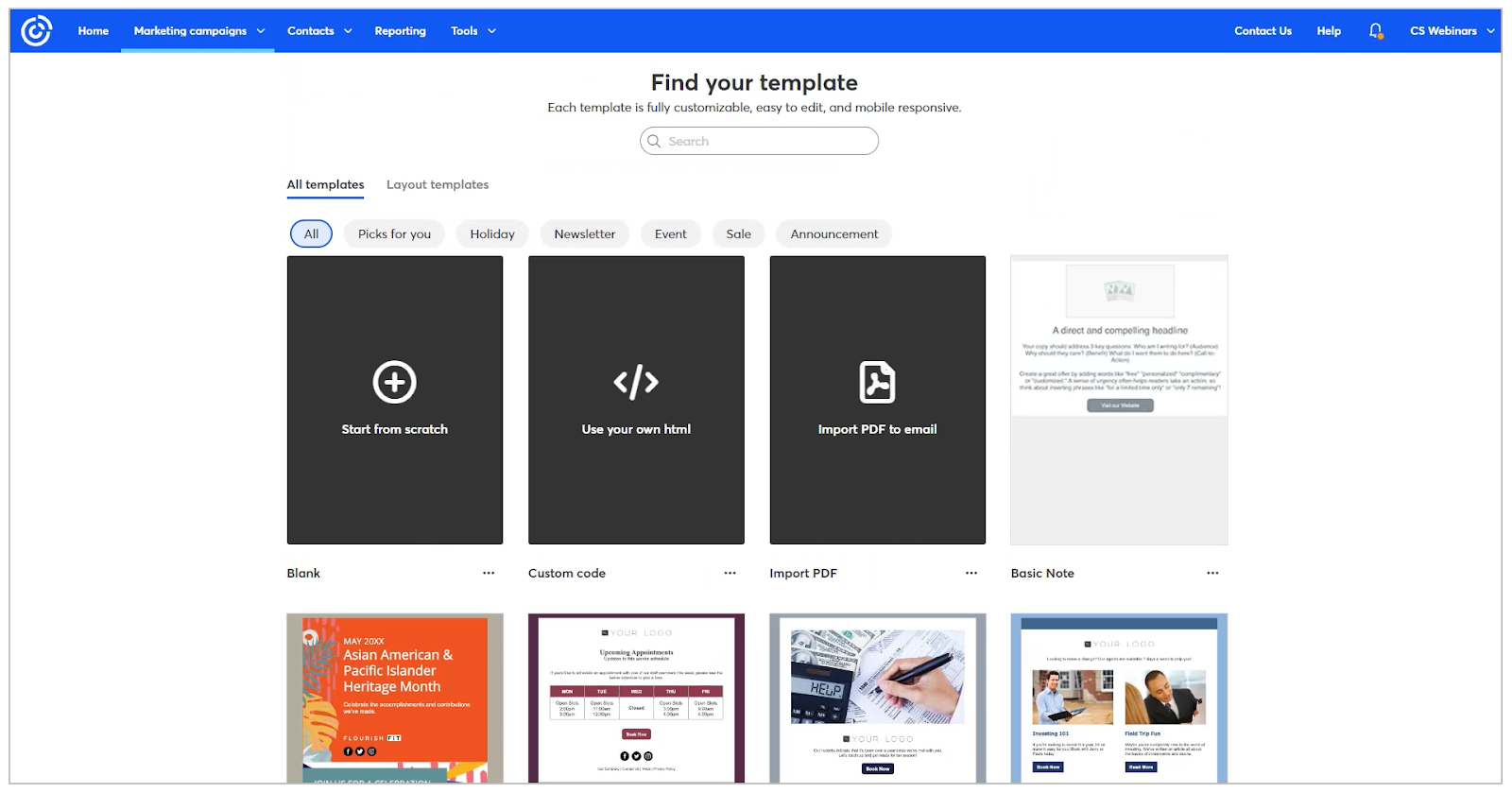
Constant Contact and Mailchimp are headed in the same direction—to be an all-in-one marketing platform for your emails, SMS campaigns, social posts, and ads.
But, Constant Contact takes it a step further with its event management tools. These let you create event registration forms, promote them via the built-in marketing channels, and accept payments via Stripe and Paypal. These are super helpful for running online classes and workshops.
Even though Constant Contact has more marketing tools than Mailchimp, it manages to still keep a user-friendly interface. This way, you can quickly get started with launching your email campaigns and events.
Pros:
- Over 300 email templates
- Website, landing page, and survey builders
- Schedule posts for Facebook, Instagram, and LinkedIn
- Live chat, email, and phone support available on all plans
Cons:
- You can only test subject lines with A/B testing
- A/B testing and CRM features aren’t on the starter plan
- Ad management is only available on the Premium plan
Pricing:
Constant Contact doesn’t have a free plan, only a free 14-day trial. The Lite, Standard, and Premium plans start at $12/month, $35/month, and $80/month for 500 contacts. Also, the monthly email sends on these plans are limited to “10 x Contacts”, “12 x Contacts”, and “15 x Contacts” respectively. If you exceed this limit, you’ll be billed at $0.002 per “extra email”.
Note that SMS marketing is only available to US customers and can be purchased as an add-on on any of the paid plans.
6. ActiveCampaign: Best for executing advanced sales and marketing automations
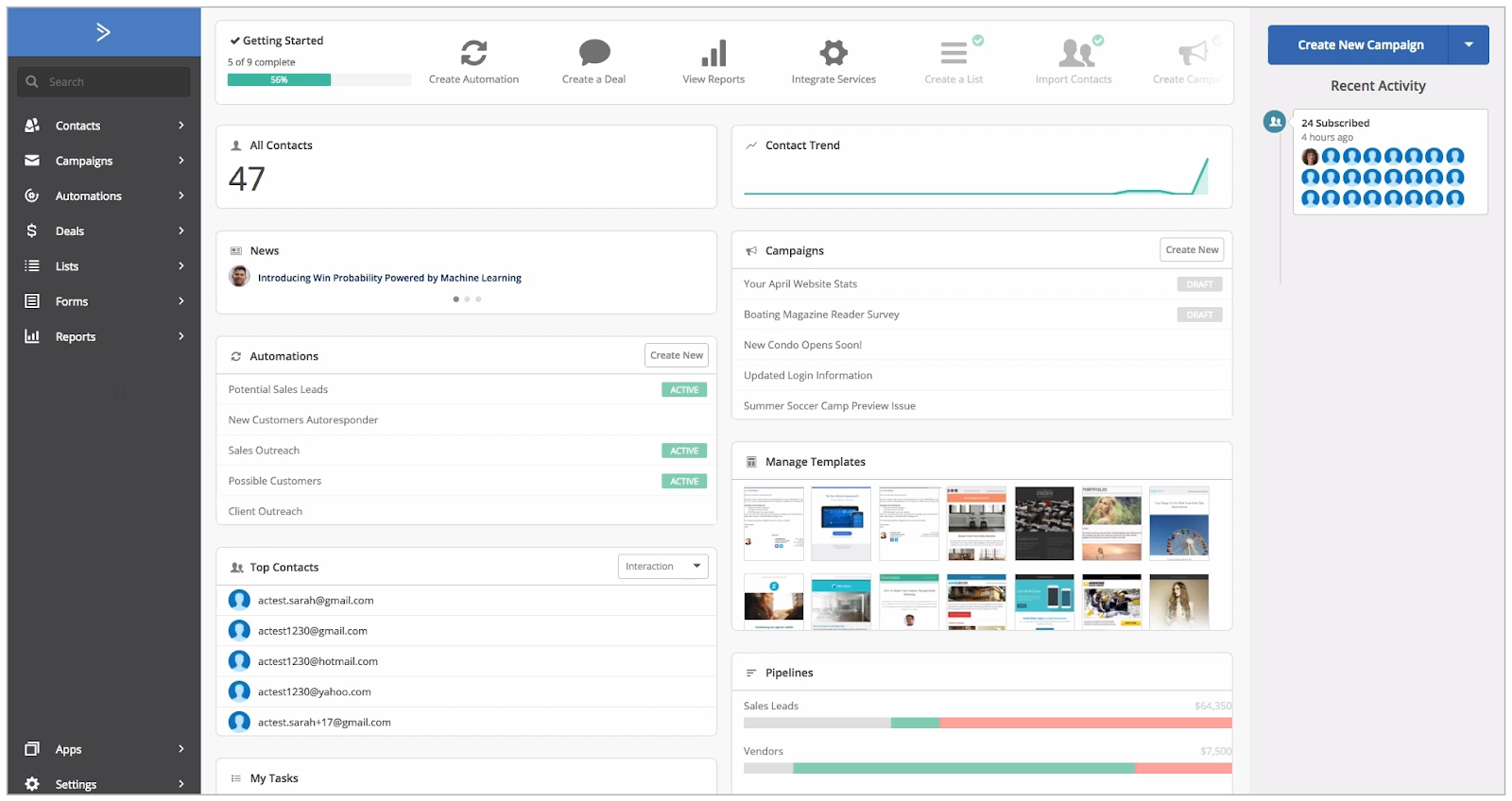
ActiveCampaign is an email and SMS marketing automation platform. If you’re a medium to large business that has outgrown Mailchimp’s automation and segmentation features, this might just be the tool for you.
With ActiveCampaign, you get over 120 automation templates categorized under industries like software, media, and ecommerce. You can customize them with any of the 75+ automation triggers and actions to create complex multi-step workflows.
Then there’s the built-in CRM features that let you create and manage your sales pipeline, qualify leads with lead scoring, automate follow-ups, and close deals.
Pros:
- Over 900 native integrations
- A/B test email subject lines and content
- Adjust lead scores based on your contacts’ behaviors
- Segment contacts based on their details and behavior on your website and emails
Cons:
- Expensive plans
- Steep learning curve
- Advanced CRM features are only available as a paid add-on
Pricing:
There’s no free plan but they do offer a free 14-day trial. The Starter, Plus, Pro, and Enterprise plans start at $15/month, $49/month, $79/month, and $145/month for 1K contacts. The monthly emails on these plans are limited to“10 x Contacts” on the Starter and Plus plans, “12 x Contacts” on the Pro plan, and “15 x Contacts” on the Enterprise plan. To increase your email send limit, you’ll have to purchase the extra sends addon which starts at $5/month for 5,000 emails.
Note that you have to pay for the SMS add-on separately.
7. Klaviyo: Best for large ecommerce brands with complex needs

Klaviyo is another email and SMS marketing platform, however, it's got more advanced features than Mailchimp for ecommerce brands. For example, besides adding new product arrivals and best sellers to your email campaigns, Klaviyo lets you add personalized product recommendations based on products a customer viewed, added to cart, or purchased.
Additionally, Klaviyo has a powerful predictive analytics tool that lets you forecast a customer’s next order date, average order value, and churn risk. And even better, you can segment customers based on these predictive insights and target them with personalized email and SMS campaigns.
Pros:
- Advanced ecommerce analytics
- Benchmark your campaign performance against industry peers
- Use A/B test tool to optimize email subject lines, content, and send times, as well as popup forms
Cons:
- Free plan is heavily limited
- Takes a while to learn its features
Pricing:
Klaviyo has three pricing tiers that unlock all features. The Free plan allows for 250 active profiles and 500 monthly emails. The Email plan starts at $20/month for 500 active profiles and 5K monthly emails. Finally, the Email and SMS plan starts at $35/month for 500 active profiles, 5K monthly emails, and 1,250 monthly SMS credits.
8. Omnisend: Best for small to medium ecommerce businesses
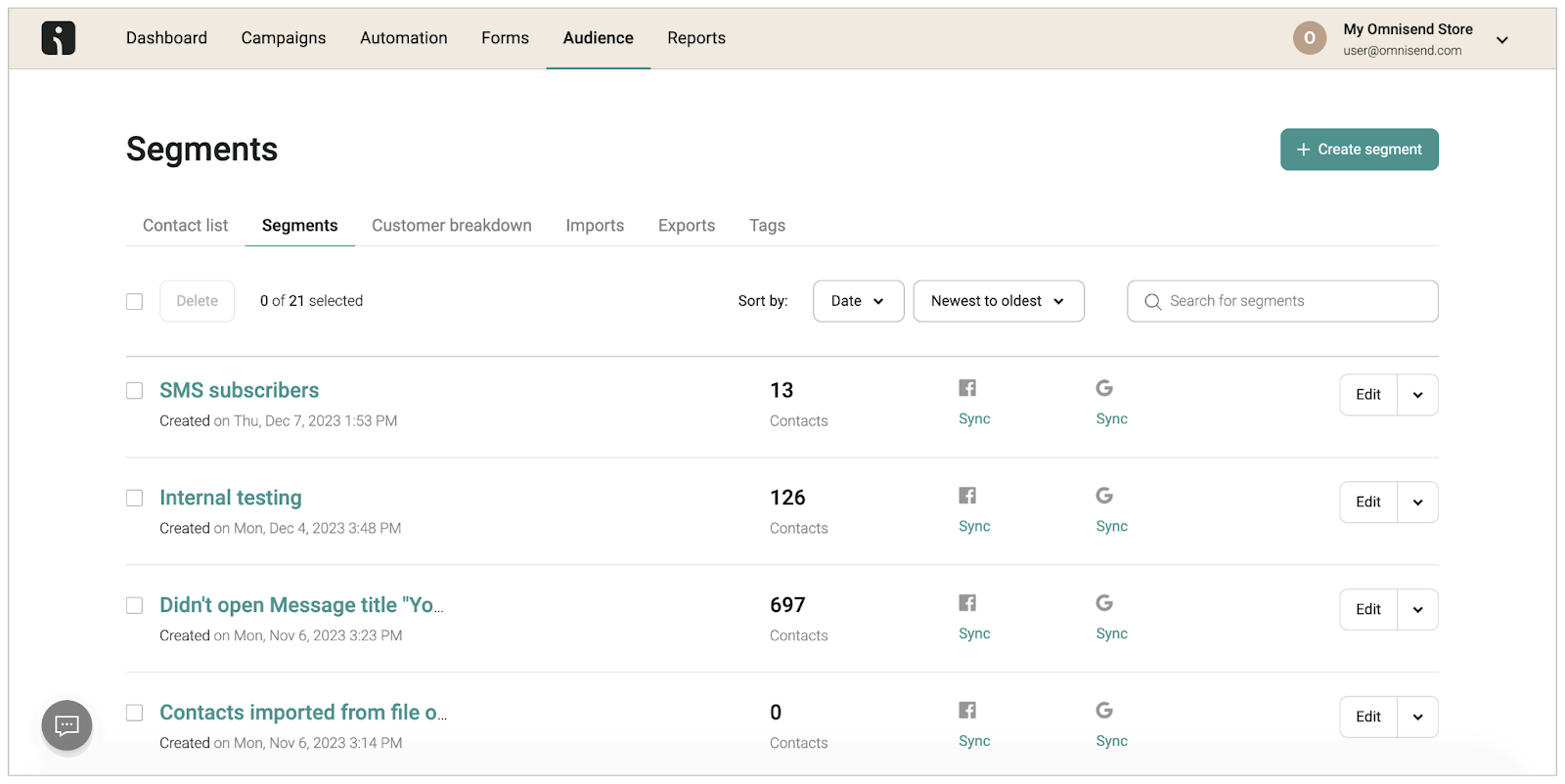
Omnisend is an omnichannel marketing platform for emails, SMS campaigns, and web push notifications. While Mailchimp and Omnisend have similar email editors, Omnisend stands out with its “Quick add” block that lets you reuse content blocks in multiple emails.
Omnisend also stands out with its unique “Wheel of Fortune” tool, which you can add to signup forms to encourage users to take a desired action and reward them with fun prizes.
Overall, Omnsiend has more ecommerce tools than Mailchimp, but it still lacks certain advanced features in Klaviyo. As a result, it’s generally easier to use and more affordable, making it the perfect fit for small ecommerce brands that want to start running marketing campaigns without much hassle.
Pros:
- Over 100 native integrations
- A/B test email subject lines, content, and sender name
- 24/7 live chat and email support on free and paid plans
- Add unique discounts in email campaigns for each customer
Cons:
- You need the Pro plan to send unlimited monthly emails
- Can’t A/B test popup forms
Pricing:
Omnisend’s three-tier pricing plan unlocks all features. The Free plan allows for 250 contacts, 500 monthly emails, and 500 monthly web push notifications. The Standard plan starts at $16/month for 500 contacts, “12 x Contacts” monthly emails, and unlimited web push notifications. The Pro plan, which starts at $59/month unlocks unlimited monthly emails and free SMS credits.
SMS credits are priced separately, starting at $10/month for 667 SMS sends.
9. GetResponse: Best for running email and webinar marketing campaigns
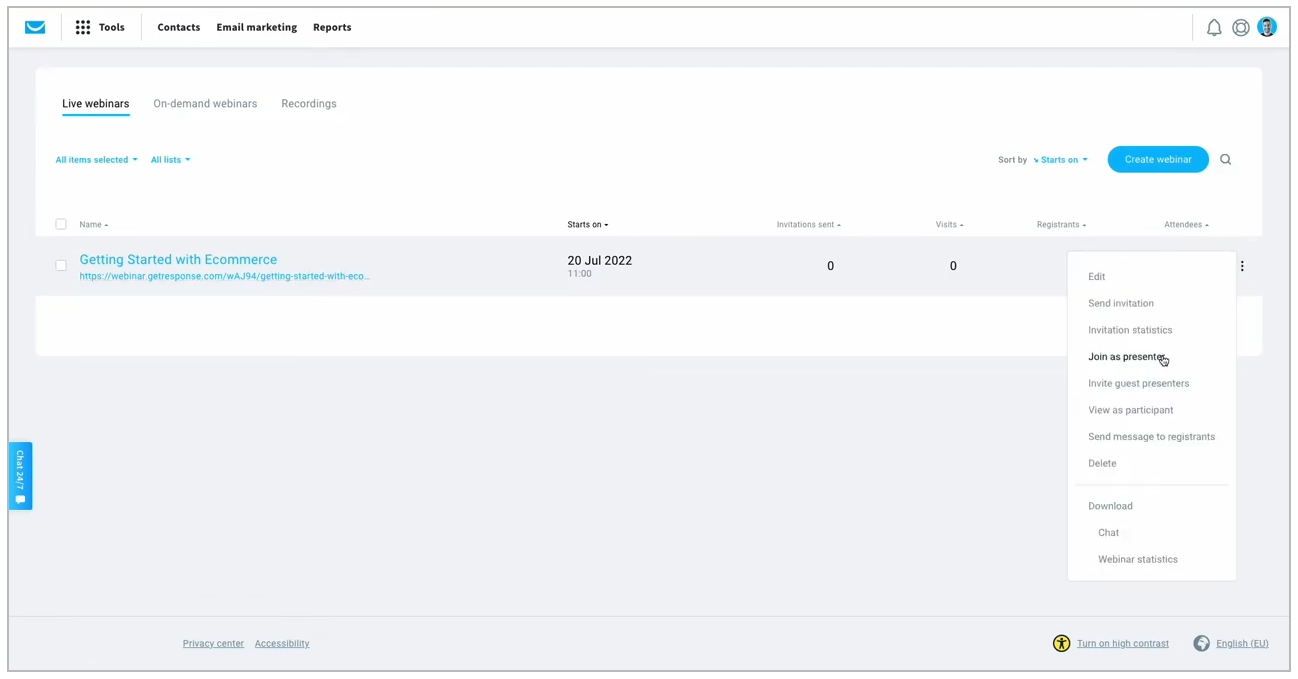
GetResponse covers most of the advanced email automation and segmentation features in platforms like Mailchimp and ActiveCampaign. Besides this, it has hundreds of newsletter, landing page, website, and signup form templates.
The built-in webinar management tool differentiates GetResponse from the rest. Create live and on-demand webinars from your desktop or mobile, promote them with the built-in marketing tools, and accept payments via PayPal, Stripe, and Square. After the webinar, you recieve webinar analytics that include number of attendees and average attendance time.
Pros:
- Add live chat to your website
- Split test email subject lines and content
- 24/7 email and chat support on paid plans
- Manage Google and Facebook ads from your dashboard
Cons:
- Free and starter plans don’t have webinar features
- Phone support is only available on the MAX plan
Pricing:
GetResponse’s free plan unlocks 500 contacts and 2.5K monthly emails. The Email Marketing, Marketing Automation, and Ecommerce Marketing plans start at $19/month, $59/month, and $119/month for 1K contacts and unlimited monthly emails.
Then there’s the GetResponse MAX plan, which starts at $1,099/month. It unlocks premium features like SMS marketing, web push notifications, transactional emails, and priority support.
10. Sender: Best for startups looking for a basic and low-cost solution
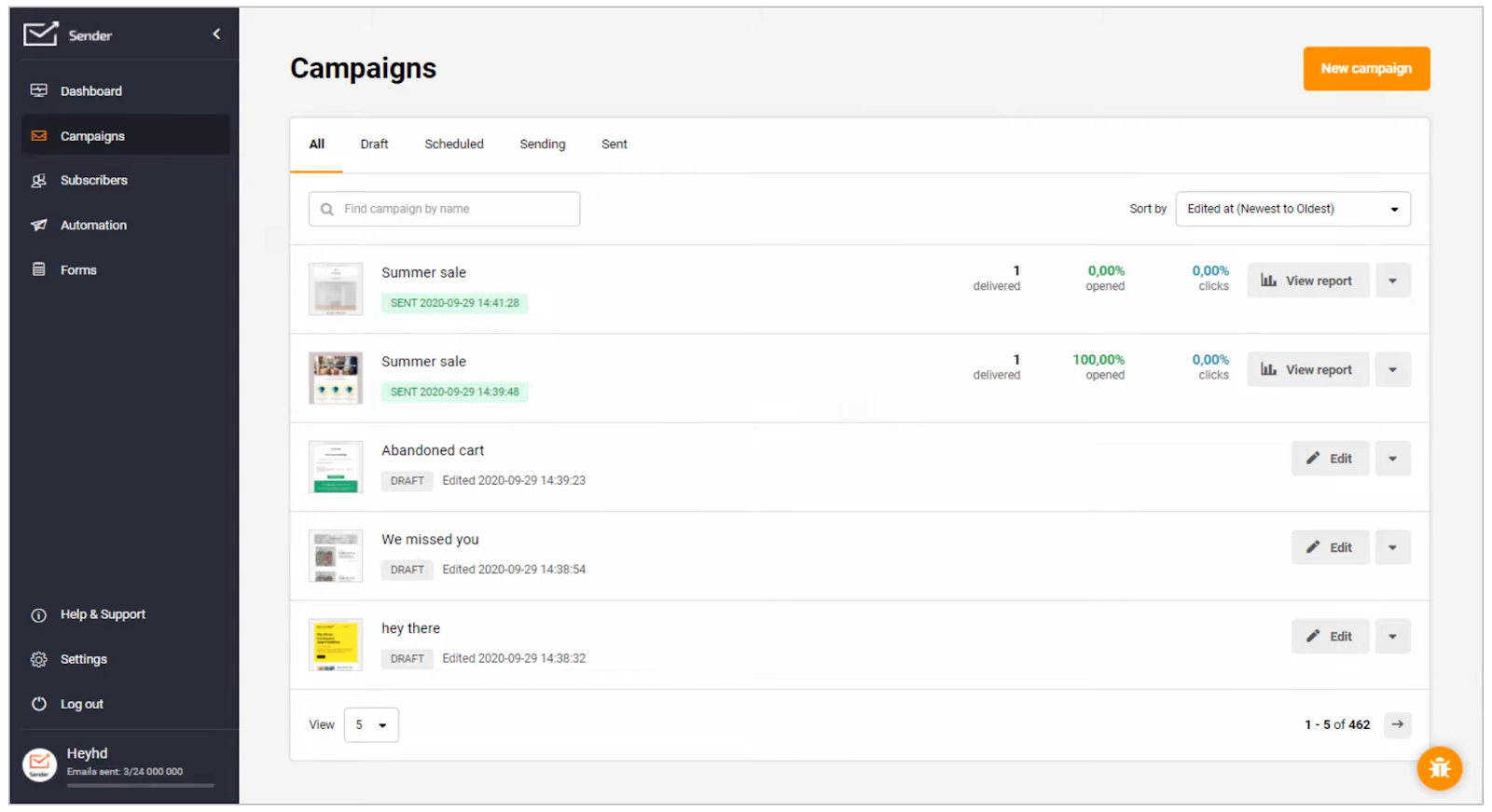
Sender is one of the few email marketing tools that’s super easy to use with a generous free plan and affordable paid plans. While it covers features like a drag-and-drop email editor, sign up forms, and automations, it still lacks certain key features in Mailchimp.
For example, Sender doesn’t have website and landing page builders. It also doesn’t have an A/B testing tool for optimizing your emails, signup forms, and automations. If you’re on a tight budget and these limitations aren’t an issue, Sender might be a fit for you.
Pros:
- Extensive options for customizing the behavior of popup forms
- Add countdown timers and customer reviews to your emails (Pro plan)
- Get automation, segmentation, and 24/7 chat support on free and paid plans
Cons:
- Free and starter plans don’t support transactional emails
- Phone support is only available on Enterprise plan
Pricing:
Sender’s Free plan has 2.5K subscribers and 15K monthly emails. The Standard plan starts at $19/month for 2.5K subscribers and 30K monthly emails and the Professional plan starts at $35/month for 2.5K subscribers and 60K monthly emails. Plus, there’s an Enterprise plan with custom pricing that unlocks unlimited emails.
For those who don’t send regular emails, Sender has an alternative “pay as you go” email plan for you. It starts at $29/month for unlimited contacts and 5K emails that never expire.
11. Moosend: Best for growing businesses that need advanced automation
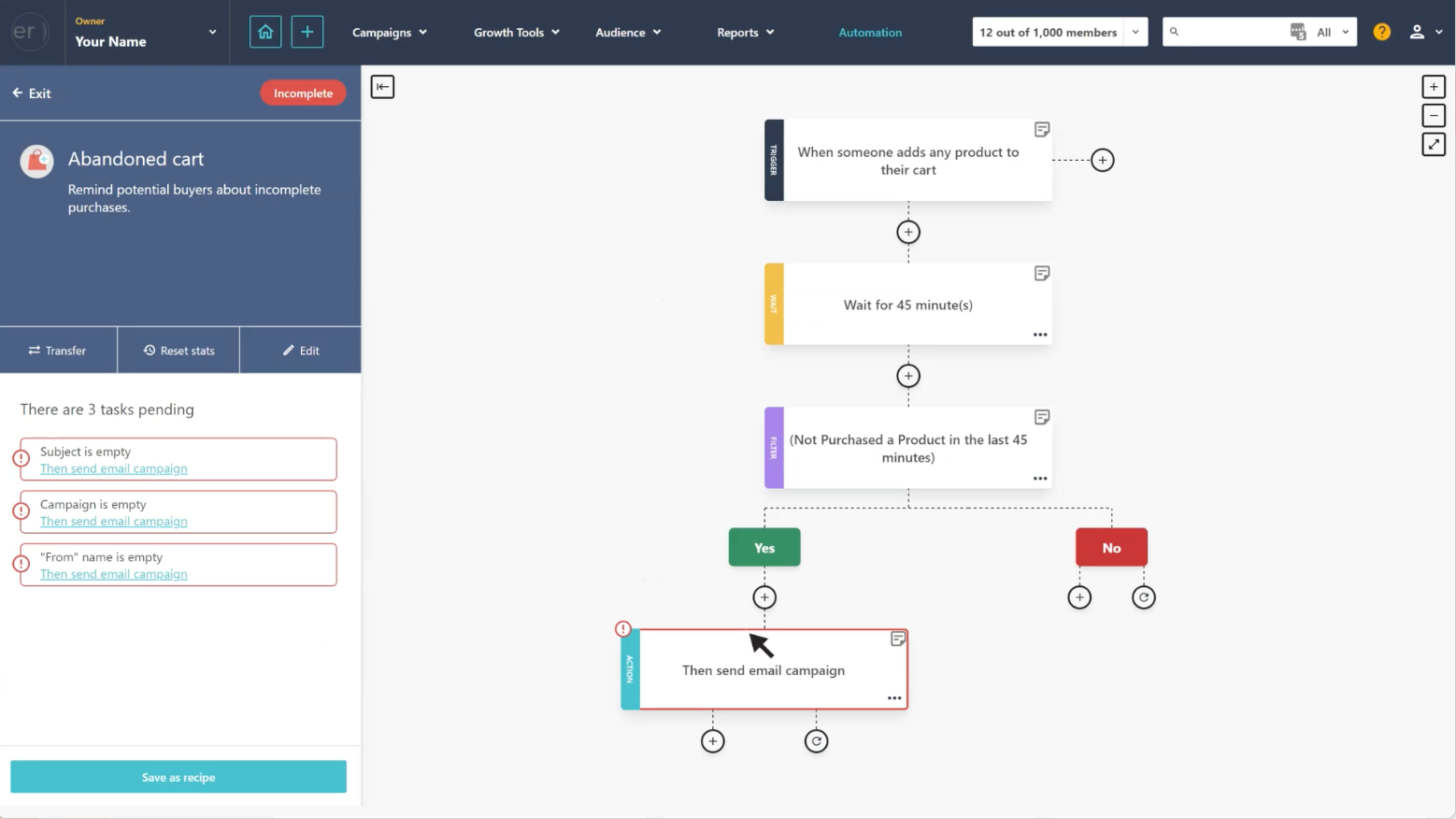
Like Mailchimp, Moosend offers email marketing basics with automation and campaign tools. However, Moosend sets itself apart with features like ecommerce AI and weather-based personalization that you'd typically find only in premium-priced platforms. Its visual automation builder lets you create everything from simple welcome emails to complex customer journeys, all without needing technical expertise.
If you're looking for powerful marketing features without the hefty price tag, Moosend's platform might just be what you need. Its template library and drag-and-drop editor help you create professional campaigns quickly, while the AI engine automatically generates product recommendations based on customer behavior. Plus, you get detailed analytics and transactional email support right out of the box.
Pros:
- Send unlimited emails on every plan
- Create visual automations with AI-powered features
- Design professional emails with an easy-to-use template library
- Get 24/7 customer support on all plans
Cons:
- Limited customization options for form builder
- No SMS marketing capabilities built into the platform
- Fewer third-party integrations than Mailchimp
Pricing:
Moosend offers a 30-day free trial that includes all Pro features with 1,000 subscribers and unlimited emails. The Pro plan starts at $7/month for 500 subscribers with unlimited emails when billed annually.
As your subscriber count grows, the pricing scales accordingly. For organizations needing more advanced features, Enterprise plans are available with custom pricing.
12. EmailOctopus: Best for simple, cost-effective email marketing
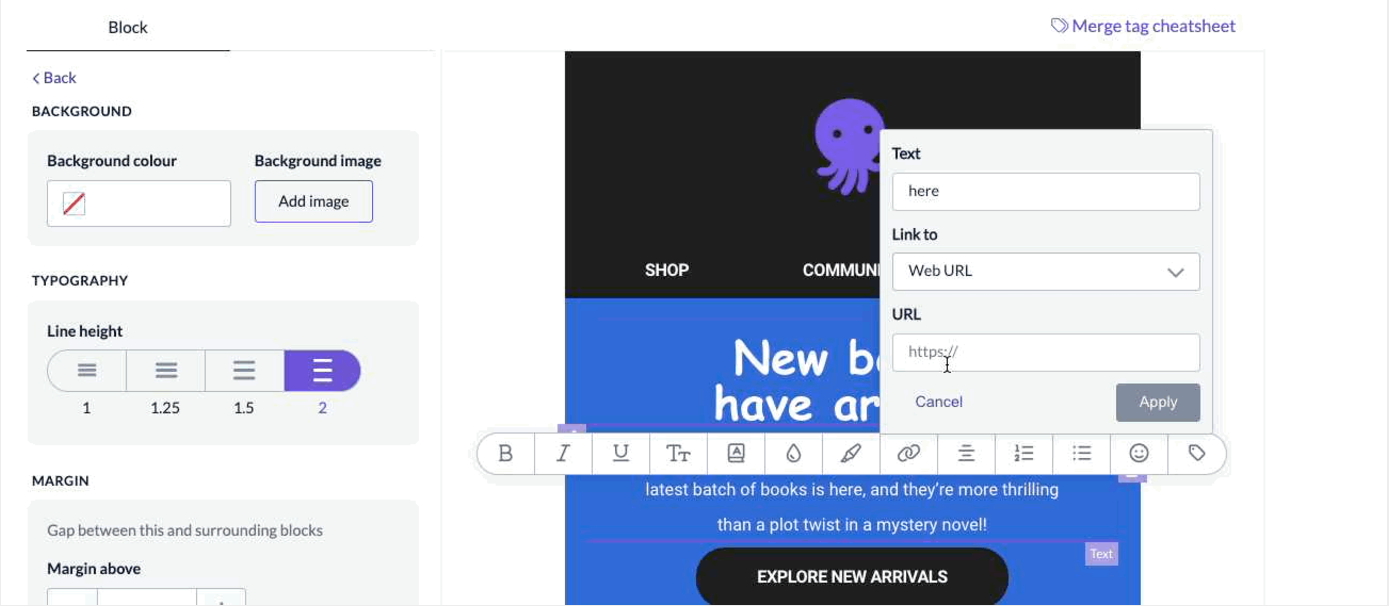
EmailOctopus is an email marketing platform that helps you save on costs without losing the key features you need. If you’re currently using Mailchimp but find the pricing a bit high for the features you actually use, EmailOctopus offers similar tools at a more affordable price.
EmailOctopus provides 34 responsive templates, which might not be as many as Mailchimp offers, but each one is modern and mobile-friendly. The platform is simple to use, making it easy to set up automations like welcome emails and drip campaigns without the complexity that sometimes comes with Mailchimp.
What sets EmailOctopus apart is its Amazon SES integration. By sending your emails through Amazon's email infrastructure, you get reliable delivery at a much lower cost than Mailchimp. This makes EmailOctopus an attractive choice for businesses looking for cost-effective, professional email marketing.
Pros:
- Easier to create and send campaigns in less time
- Edit email content directly in the preview
- Create automated workflows without complex settings
- Get priority support even on lower-tier plans
Cons:
- Fewer template options than Mailchimp's library
- No mobile app for campaign management
- More basic automation capabilities
Pricing:
EmailOctopus offers a free plan with 2,500 subscribers and 10,000 monthly emails. The Pro plan starts at $24/month for 5,000 subscribers and 50,000 monthly emails. With Amazon SES integration, the Pro plan drops to $20/month for the same limits. All paid plans include unlimited landing pages, forms, and permanent access to reports.
13. HubSpot: Best for comprehensive marketing automation

If you've hit the limits of what Mailchimp can do for your marketing, HubSpot offers a more powerful solution. You'll get not just email marketing, but a complete system that includes CRM, social media, advertising, and website tools in one platform.
The real difference comes in how deeply you can automate your marketing. Instead of Mailchimp's basic email sequences, HubSpot lets you create marketing workflows that respond to how people interact with your entire digital presence. You can also track every customer interaction using the built-in CRM system to create targeted campaigns based on actual customer behavior.
Pros:
- Create AI-generated copy for emails and social posts
- Build custom side-by-side reporting dashboards
- Over 1,700 integrations through app marketplace
- Access HubSpot Academy and Community resources
Cons:
- Only basic features available on free plan
- Need Professional plan for phone support
- Requires $3,000 onboarding fee for Professional plan
Pricing:
HubSpot offers a free plan with essential marketing tools to get started. The Starter plan is priced at $15/month for up to 1,000 contacts. For more advanced features, the Professional plan starts at $800/month and includes a one-time $3,000 onboarding fee. Enterprise pricing is available for larger teams with customized needs.
14. Benchmark Email: Best for small businesses wanting an easy-to-use platform

Benchmark Email is an email marketing platform designed to simplify newsletters and campaigns for small businesses. Compared to Mailchimp, it focuses on ease of use with a cleaner interface and core features like customizable templates, basic automation, and contact management.
For example, if you want to send newsletters, set up automated welcome emails, or run drip campaigns, Benchmark makes it easy with a drag-and-drop editor and over 200 templates tailored to various industries. Unlike Mailchimp, you won’t need to navigate through extra tools like predictive analytics or ecommerce-specific features unless you really need them.
Pros:
- Generous free plan with 3,500 monthly emails for 500 contacts
- Simple drag-and-drop editor with plenty of templates
- Clear and intuitive interface perfect for beginners
Cons:
- Limited automation options compared to Mailchimp
- Fewer advanced tools, which may limit scalability
Pricing:
Benchmark Email offers a Free plan with 500 contacts and 3,500 monthly emails. It also has a Lite plan starting at $9.99/month for 500 contacts, which includes templates and basic automation. The Pro plan, priced at $13.99/month, adds unlimited email sends and A/B testing. For businesses with more than 25,000 contacts, the Enterprise plan provides custom pricing and advanced features.
15. Mailjet: Best for companies needing collaborative email marketing tools

If your team constantly collaborates on email campaigns, Mailjet approaches things differently than Mailchimp. Instead of paying based on contacts, you get unlimited contacts and pay only for the emails you send. This means your whole marketing team can work on email templates together in real-time, each person with their own access level—something you can't do in Mailchimp.
Want to create emails as a team? Mailjet lets everyone work on the same template at once, with controls to lock certain sections and manage who can edit what. You'll get AI assistance for writing email copy and subject lines, plus features like dynamic content and A/B testing on higher plans.
Pros:
- Create and edit email templates with real-time team collaboration
- Get AI-powered help with email copy and subject lines
- Access marketing automation and A/B testing tools
- Work with unlimited contacts on all paid plans
- Use SMTP relay and webhook features for developers
Cons:
- Need Premium plan for basic features like A/B testing
- Limited to 200 emails per day on free plan
- Most advanced features locked behind higher tiers
Pricing:
Mailjet offers a free plan with 6,000 monthly emails (200 per day). The Essential plan starts at $17/month for 15,000 monthly emails with unlimited contacts. The Premium plan at $27/month adds A/B testing, automation, and team collaboration features. Custom Enterprise plans are available for larger needs.
Which Mailchimp alternative is best for you?
Mailchimp is great at what it does, but that doesn't mean it's right for your business. After going through our list of alternatives, you should have a better idea of which tool matches what you need. Not sure yet? No problem—most of these tools let you try them for free.
Take Whop, for example. You can access every feature on their free plan to see if it works for you. Get access to automatic messaging flows, newsletters, and more, without paying anything upfront.
Creating an online business? Build it with Whop
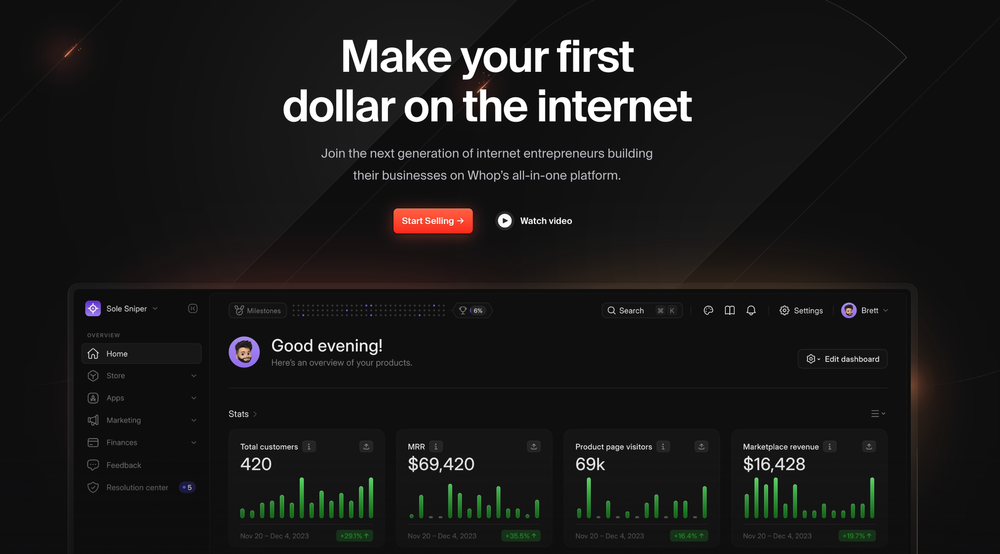
Email marketing is just one aspect of building an online business. Besides that, you’ll need a reliable platform to grow your income streams.
Whop lets you build, manage, and monetize access to your digital products and services with ease, whilst also engaging with your community. Let Whop handle the heavy lifting so you can focus on making strategic decisions that move your business forward.
Get started with Whop for free today.


